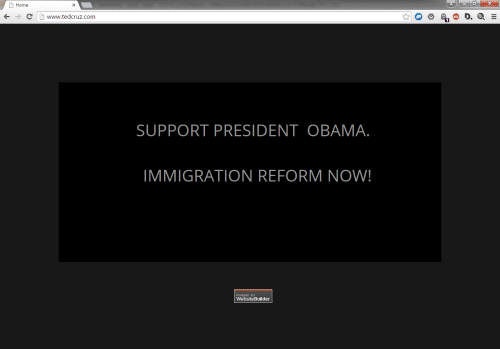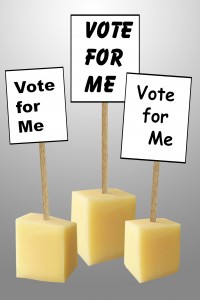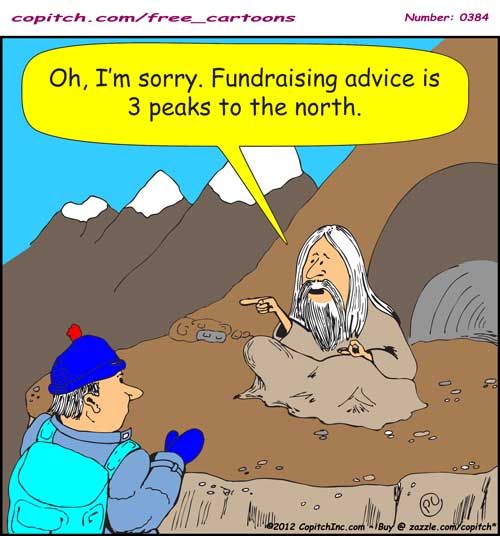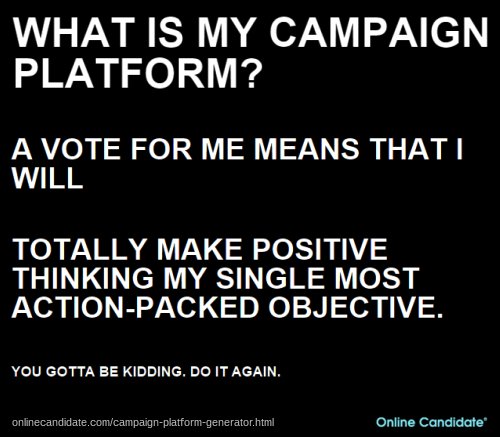5 Misconceptions About Online Campaigning
 Q: My political campaign is very small, it will be over fairly soon, and our voter turnout is low. Do I really need to bother with online campaigning?
Q: My political campaign is very small, it will be over fairly soon, and our voter turnout is low. Do I really need to bother with online campaigning?
A: Absolutely. In fact, online campaigning can be more important for smaller, local elections. Using the web to get out the vote can make all the difference when a race is decided by a handful of votes.
Even so, there are candidates who, for one reason or another, are not comfortable using the web for campaigning. Here are some common arguments against online campaigning … and why they are wrong.
My race is too small to bother with online stuff
As we often say, “If you are not putting information about yourself online, then someone else will.”
If your opponent is defining you online, then you have a problem.
You can ignore the online aspect to political campaigning, but you are only hurting yourself. When voters search for information about a race, they expect to find information about the candidates. With your own campaign website and social media presence, you can take charge and present your own ideas and messaging.
Even the smallest campaigns are engaging voters online. Heck, just this year we had our first sorority president election candidate.
I don’t have the tech experience to run a website
The hub of your online campaign is your campaign website. You cannot effectively run a campaign from a Facebook page. Not everyone is on Facebook; your messaging only reaches a tiny sliver of your followers (unless you pay for each post), and you don’t control the platform. Branding yourself online begins with owning your own domain name and website.
As far as learning to manage and update your site, that depends on how your website is built. If your site uses a content management system (CMS), you are able to add and edit your own content. With any CMS, though, there is a learning curve. One thing you don’t want to do is put control of updating your site in another person’s hands. You need to be able to make your own site updates and to be able to react quickly to events.
My election isn’t worth promoting on social media
If you are already using Facebook, then you already have a good understanding of how it works. Create a campaign page, tell your friends, and start making updates. If you are familiar with Twitter, create a campaign account and begin using it.
One thing you don’t want to do is spread yourself too thin. Don’t start up a bunch of campaign social media accounts and just let them sit there. It’s better to start off with what you can handle and add to your efforts as your resources grow.
Don’t know what to post? There are plenty of things that you can mention and discuss. You can post about upcoming events, news articles, campaign trail photos, your latest ads, campaign achievements, and more. Use a mix of pre-planned and off-the-cuff posts to keep your communication both consistent and interesting. Creating your own social media schedule will help.
I can do all my online campaigning through my Facebook page
How could running an online campaign through Facebook be a bad idea? Facebook has hundreds of millions of users and is one of the most popular websites in existence. Not only that, it’s free!
Good points, but the reality is not as simple. Having a campaign Facebook page is a great idea, and if you are running, any serious political campaign, no matter how small, should create a Facebook page in order to reach out to supporters and voters.
Using Facebook as a replacement for an actual stand-alone campaign website is a mistake. Here’s why:
- Facebook is a closed network. In order for people to see your Facebook content, visitors are required to join. Not everyone is a member of Facebook, and some people will never become members.
- Your information is not your own. Your page is also subject to the generosity of Facebook, which can pretty much remove anything it wants at any time. If you are or if someone claims you are violating their Terms of Service, you could be in trouble.
Raising money online isn’t worth the effort
If you already have a campaign bank account, then you’ve already done the hard part. Yes, you can take online donations through PayPal, but you need to collect additional donor data (our system has a built-in form for collecting this information). Political-specific fundraising services make it extremely simple to set up an account, add forms to your campaign website and to take donations through social media and email.
Many online donation tools let donors set up recurring donations throughout the campaign.
Besides, many donors prefer to give online than to go through the hassle of writing a check. “Impulse donors” who are influenced by your campaign are also more likely to give. People are busy; make it easy for them to help you.
My online campaign will pull in tons of money
Can your political campaign raise a lot of money online? Absolutely, but it takes work and coordination. Use your offline events to drive people to your website and make good use of your email list. Make it easy to donate online and leverage your other sources of communication to make your supporters aware of how and when they should donate.
If done properly, the effort put into online fundraising will pay off.
It’s hard to get started
No, it’s not. Your greatest ally in becoming good at this ‘online stuff’ is time. Start early. Create and use personal social media accounts to figure out how they work. Learn about your options and take the time to plan your online campaign.
What Local Candidates Can Learn From Botched Presidential Launches
As the United States presidential election race geared up in 2016, several candidates already stumbled out of the gate. If you are a local candidate running for office, you can learn a thing or two from these online presidential candidate gaffes.
Ted Cruz Hopes You Can Type The Right Address
In March, Sen. Ted Cruz (R-TX) announced that he was running for president in 2016. Unfortunately, he missed was unable to purchase a domain that featured his own name. Someone else reserved it first.
So with the .com domain name taken, the Texas senator settled for tedcruz.org as his official campaign website.
Big mistake.
When a website address is a .org domain, how many people will often type ‘.com’ out of habit?
As of this writing, a web user going to tedcruz.com will see this:

If you don’t secure your own domain name, someone else will.
Ouch. This is probably not what the senator had in mind.
The takeaway:
A domain name is your online calling card. If you think you will be running for office, reserve your domain name as early as possible. And always get the .com version of the name. If it’s already taken, you may want to go for an entirely different domain. The last thing you want is for someone to control the .com version of your campaign website. All things considered, the person who registered tedcruz.com domain went easy on the senator.
Rand Paul Schools Us All
In April, Senator Rand Paul announced his own presidential campaign. While he has control over the .com version of his domain, the launch of his website was marred by an embarrassing gaffe.
On a video on the site, the title of the clip misspelled the word “education.” This was made even worse by the fact that the typo was on the candidate’s education platform page.
It said, “Rand Paul Opposes A One-Size-Fits-All Approach to Eductation.” Ouch.

Typos happen, but when it’s right out of the gate, it’s even more embarrassing.
The takeaway:
While you would think large campaigns would have editorial procedures in place, even silly mistakes can slip through. Remember n 2012 when former Republican presidential candidate Mitt Romney promised “A Better Amercia,” on his campaign’s iPhone app? Then as now, minor gaffes can become fodder for mockery.
[bctt tweet=”Small mistakes may seem careless, but can still turn off #voters. http://ow.ly/LHHa30gBj06″ username=”onlinecandidate”]
No matter the size of your campaign, watch your spelling and grammar before you launch your campaign website. A small mistake might appear careless, but poorly-written content will turn off potential voters. Have several people proof your content before it is put online or into print. Hire a good copywriter if you have to. Don’t think that smaller, local campaigns don’t fall under scrutiny.
These may have been the first online screw-ups of the 2016 presidential campaign, but they certainly were not the last.
Get your own domain name and launch your campaign website today! With three affordable website design packages and even a Monthly Option, Online Candidate is the online platform for hundreds of candidates each and every election cycle.
5 Reasons Why Voters Don’t Trust Your Online Campaign
 Trust. It can be hard to gain and very easy to lose. Here are five reasons why voters might not trust your online campaign – and they have nothing to do with your existing online reputation…
Trust. It can be hard to gain and very easy to lose. Here are five reasons why voters might not trust your online campaign – and they have nothing to do with your existing online reputation…
Poor Grammar and Spelling
If your website, press releases and social medial posts are full of grammatical errors and typos, it shows a lack of professionalism. On local campaigns, voters may even question your literacy of the candidate, since they figure it was probably written by the candidate.
For social media, Twitter has its own shorthand. For everything else, keep it professional.
Lack of Personal Information
Who are you? What is your background that qualifies you for office? What history do you have with your community and its happenings? What obstacles have you overcome to help you get to where you are today? Your history and life are unique and should be incorporated into your campaign.
[bctt tweet=”In most jurisdictions, it’s criminal for candidates lie in voter materials. http://ow.ly/WDsl30gBj8n”]
And whatever you do, don’t embellish your personal history. In most jurisdictions, it’s a crime to make false statements in voter materials.
Pictures help, too. Maybe the traditional family shot is a political-brochure cliche, but even if nothing else about a candidate’s personal life is mentioned, that one image will at least tell voters that 1) the candidate is involved with their family, 2) everyone in the family is happy, and 3) maybe they love dogs/puppies.
No Social Media Presence
This one varies depending on the campaign or elected position. Will voters think less of you because they do not have a Facebook or Twitter account? Perhaps. But if an opponent is using social media to bash you, not making a stand will eventually take its toll.
As we always say, if you don’t define yourself online, someone else will.
[bctt tweet=”If a political opponent is using #socialmedia to bash you, ignoring it won’t help. http://ow.ly/WDsl30gBj8n”]
Written By Robots
Ever visit a business web site where the business description reads as a meaningless jumble of complicated jargon? Some campaigns suffer from the same problem, especially where the website is packed with platitudes and PC mumbo-jumbo. You are trying to connect with voters, not to lay out a political treatise. Keep your language plain and your ideas succinct.
People Just Don’t Trust The Internet
Politicians in general may not be considered particularly trustworthy, but most people don’t trust what they see or read online, either. With that in mind, unless you are catering to your base, you might want to keep away from hyperbole and overly-broad generalizations. It can weaken your credibility.
A great campaign presence begins with Online Candidate. Learn how we can give your campaign the winning edge!
Campaign Writing Can Make or Break a Vote
 First impressions will make or break a voter’s support. The campaign material you distribute should always be your best work.
First impressions will make or break a voter’s support. The campaign material you distribute should always be your best work.
Recently, a local candidate running for village trustee left some campaign literature at our door. I had not heard of this candidate before, and my first exposure to him was through his brochure.
And judging by the brochure itself, it’s highly unlikely that I will be voting for this person next month.
It wasn’t that the brochure wasn’t attractive. In fact, the piece was well-designed. It was nice and clean, without a lot of clutter that you sometimes see on campaign literature.
Rather, the problem was with the copy. The brochure was poorly written and contained a number of grammatical errors. It took two or three readings to get the gist of what the candidate was trying to say about his background and vision for the village. There were run-on sentences, bad punctuation and mangled syntax. It felt like I was like reading the first draft of a fourth-grader’s civics essay.
Sadly, the candidate’s bio stated that he was a college graduate.
As you can imagine, the candidate failed to gain my support. If a candidate cannot take the effort to clearly articulate his or her thoughts on paper, how can I trust them to deal with the complex issues of governing?
The moral of this story is to always prufread proofread your campaign materials. Even if you think it’s great, have another set of eyes go over it. Make your revisions and continue rounds of proofreading until your wording is perfect.
Only your best work should be presented to the public. In many cases, voters will only know of you through your campaign literature.
In this case, it only took one brochure to lose my vote.
Looking for campaign brochure templates? Free up your valuable time with our Political Print Templates. They will add a professional edge to your campaign print material. Or see all products in our Download Store.
Check Out Our New Political Platform Generator Tool [Fun]
 Coming up with campaign slogan isn’t too hard. The real work comes when it’s time to come up with a political platform to attract voters.
Coming up with campaign slogan isn’t too hard. The real work comes when it’s time to come up with a political platform to attract voters.
Fortunately, like everything else, the problem can be solved with computers!
We just put together a great political platform generator tool to help candidates come up with just the right campaign promise to target their most important constituents.
It’s simple. It’s easy. And if you don’t like the examples, let the tool create a new campaign promise for you!
Check out our Political Campaign Platform Generator!
(If you like it, tell your friends – but make sure you keep it from the opposition!)
For those of you looking for a real definition:
A political platform is a list of actions or policy stances that a candidate, political party, or organization supports or endorses. A platform is designed to appeal to voters in order to win and office or elected position.
5 Tips To Mix Online Into Your First Fundraising Event
 There is a lot of advice about planning and running your first fundraising event. Conventional wisdom is that your initial fundraising event will provide the seed money to get things started, including starting your online presence.
There is a lot of advice about planning and running your first fundraising event. Conventional wisdom is that your initial fundraising event will provide the seed money to get things started, including starting your online presence.
That’s not necessarily true.
Your online campaign should start long before your announce that you are running for office.
In fact, it’s a great idea to have your campaign website and social media accounts up and running long before your first big fundraiser. Your means of taking online donations should also be in place.
With some planning, you can use your existing online presence to turn your fundraising event into something that increases awareness, attracts more interest in your campaign – and perhaps brings in some additional money!
Here are a few things you want to do to make the most of your big event:
Set up for online donations.
Even if event attendees have paid for tickets, you can still use your campaign fundraiser event to bring in even more money. If possible, set up a laptop to show off your campaign website. Encourage attendees to make an additional online donation or set themselves up for recurring donations throughout the campaign. If it’s your first event, emotions will be high. It’s a good opportunity to tap into that optimism.
Post the event to your website and social media accounts.
Encourage attendees to start following your campaign. Many can do so from their mobile devices. Before the event, ask them to Tweet and post live status updates. Let everyone know about the event #hashtag and encourage them to use it in their posts.

Ask for online contact information from your guests.
Not only should you ask for email addresses when attendees sign in, but also ask for Twitter IDs so your campaign can follow them and they can follow back.
Put your own people to work.
Have one or more insiders at the event post live during the event. Mix pre-scheduled posts using tools like Hootsuite and live posts during the event. Multiple people posting can have an amplification effect on social media. Word of the event and your new campaign will reach a much wider audience.
Do an online follow-up.
After the event, post a “wrap up” of your event’s highlights. Post photos, videos and commentary on your website and your other social media accounts. Don’t do it all at once, though. Talk about the interesting things that happened over the next few days to get some extra mileage from the event.
Hope this helps get your first fundraising event to a great start!
Want more tips and ideas on starting your online campaign? Check out our exclusive ebook Running for Office as an Online Candidate. Have your own fundraiser coming up? You can get your campaign website started fast for a price that meets any budget.





